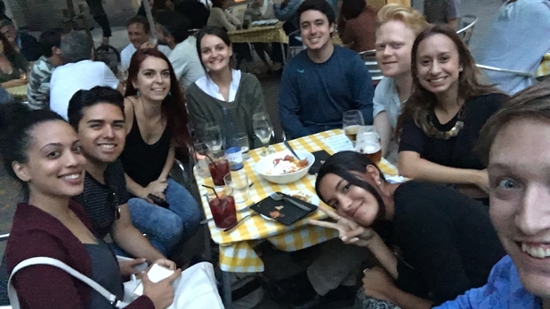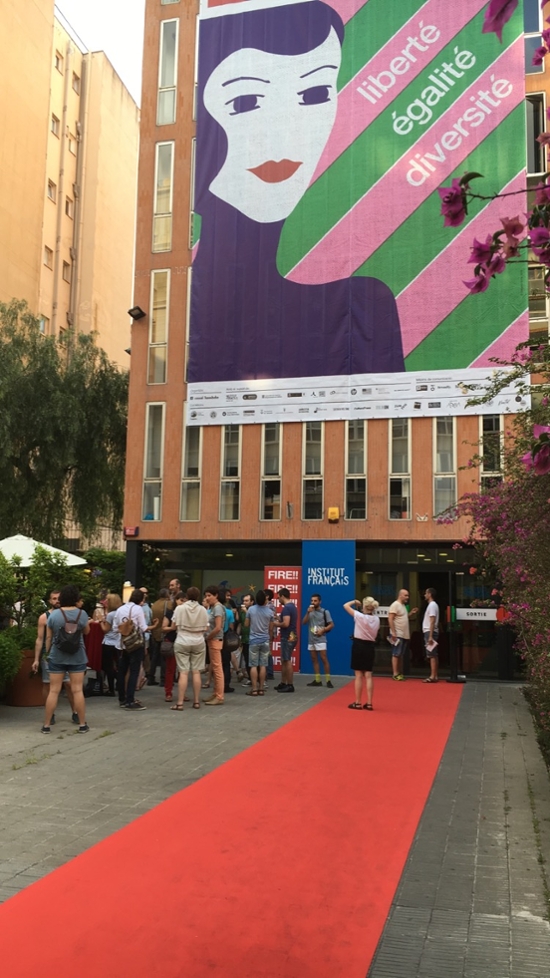Five Things You Need to Know About Interning in Barcelona

Taking some time for tapas with the rest of the Adelante Abroad squad! During the first week of the program, we met up together to talk about our different internship and to get to know one another.
Over the summer, I went to Barcelona to fulfill an internship through the intern abroad company Adelante Abroad. This experience was beyond anything I could have imagined, and went far beyond what I planned; what had started as a proposed legal internship in immigration turned into working with an associated client, Casal Lambda, an LGBT Catalunyan organization (more on that below). Not everything is going to be how you expect when you go abroad, so here are FIVE things you need to know about your time spent in Barcelona!
Catalunyans are proud of their culture
The people of Barcelona, a city within the Province of Catalunuya, take immense amounts of pride in the differences between their culture and language and other Spanish cultures, particularly Castellano. What Americans typically know as Spanish is actually of the Castellano dialect of Spain (often mixed with other dialects depending on location). Barcelona and citizens of Catalunya proudly speak Catalán as a first language, which sounds like a mix between Spanish and French. If you don’t know Catalán, people are actually more likely to speak to you in English than Catalán. As an intern that had never been exposed to the culture and only spoke Spanish, this was a bit jarring at first. It took a while to really understand the differences, and also to pick up some understanding of the language. My internship ended up being associated very strongly with the Catalán culture, and so Catalán was spoken frequently around me. Castellano was spoken on request, but was somewhat looked down upon. This was constructive though, as it allowed me to both come into a greater understanding about a society I had never been as well as attain a larger grasp on the language.
They want to declare independence from the rest of Spain
When you travel to Barcelona, you’ll likely see two flags representing Catalunya. The first is a yellow flag with red bars that span across it. The second is that same flag, but with a blue triangle on the side with a single star within it. That flag represents the Catalunyan independence movement—a movement that has been gaining speed ever since Franco died in 1975 and the government of Spain was restructured. One reason for this is because of what was described above: Cataluynans are proud of their culture and language, and believe that creating a sovereign state would protect that culture indefinitely. Another reason comes from a historical viewpoint. Many Catalunyans believe that the Castellano regions of Spain have only ever been concerned about their own well-being rather than that of the outer regions like Catalunya. Up until last century, Madrid and the Castellano regions of Spain held those of higher status, while regions like Catalunya were reserved for peasants and farmers. During my internship, the founder of the organization, Armand, recounted how much of Catalunya sees themselves as always having been oppressed by Castellano culture, and the independence movement is a way to amend that and take power back. While this itself is a more complex issue than what Armand boiled it down to, you will regularly encounter people in support of the independence movement around.
The poster I helped construct for Casal Lambda's LGBTQ film festival, FIRE!! which was in tandem with the 40th anniversary celebration of Casal Lambda. This event was publicized throughout Barcelona, including official announcements by the government of the city itself. Proud to have been a part of organizing it!
Don’t expect anything to be what you think it will be
My program, Adelante Abroad, said they would be placing me with an Immigration Law Firm, talking up the program as if I would be on the front lines with refugees. Within the first week, it was clear that my inability to speak Catalán relegated me somewhere else, as I was moved down divisions until passed off to an associated client, Casal Lambda. They are an LGBTQ organization of Barcelona that welcomes new queer people into the city and helps them adapt, have safe spaces, etc. To be completely honest, this was an even better opportunity, albeit unexpected, because I was able to gauge the level of intersectionality of Barcelona. How much do issues of queerness and race and class and refugee status and ability intersect in Spain? By the statistics, my proposal had predicted Spain to be a much more progressively minded place, as despite there being 24% unemployment immigration was still allowed and encouraged on a policy scale. The reality of the situation on the ground seemed immensely different. There was a VERY clear class and race distinction in Barcelona, with white Spaniards living in suburbs and apartments outside the city center, and with most people of color relegated to very specific neighborhoods. Many of the street vendors were African refugees; I talked to a few who said it was difficult to get employment in Barcelona aside from illicit street vending. In my internship, when myself and another American intern questioned them about intersectionality, they said that concept was relatively unfamiliar with them because “there aren’t many people of color or lower class people in Barcelona. So we don’t have many advocacy groups for them.” From my limited time in Barcelona, based on what I observed, I’m not convinced that that’s the truth. It seems more like they just aren’t really looking. Things weren’t all negative though, of course. During my time at the internship I helped host a Queer Film Festival that celebrated the 40 years that Casal Lambda had existed. A variety of films were shown, some of which introduced concepts of intersectionality to the audience that myself and my fellow intern appreciated. And of course, they were all delightfully entertaining!
Your internship program friends are a blessing
Through all the chaos that is getting to know a new city from scratch, having friends that are a part of your internship program can be a HUGE help! I met many wonderful people who felt like they were in the same boat as me, trying to understand the city and get to know its people while also dealing with the interesting administrative process of Adelante Abroad. These people easily become your squad: going to parties, exploring the cultural sites of the city, hanging out at the beach, getting tapas. BTW, here’s a deconstruction of two misconceptions Americans have about tapas. First, they are not unique or really a delicacy of any kind; they really are just small dishes that essentially every restaurant has. Most commonly you find potato based dishes, uncured ham based dishes, or olive based dishes. Secondly, they are often bland; if you love spicier food like me, stock up with spice and try to find places that serve those spices you’re probably missing.
TRY EVERYTHING
Yes, this Zootopia motto comes into good use. Whenever you are travelling to a new place, don’t leave anything out. Take out all the stops and just DO IT! There’s always so much to explore, new neighborhoods and streets to walk down, new street musicians and performers to meet, new clubs to stay at until the morning...the list goes on! Because this was my first time abroad, everything was new to me! The club experience, the city itself, the museums and history, from Park Guell to Barceloneta! And then all of the other cities I got to explore as well! From finding what dreams are made of by riding a Vespa around the Coliseum, to scaling the Eiffel Tower, to riding the London Eye outside of Shrek’s Adventure...the list is almost innumerable as to what you can and SHOULD do! PLEASE come and talk to me about my experience; I’d love to share all the cool interesting things that happened! Take advantage of the time you have; you won’t regret it!
Tags: PSF, President's Summer Fellowship, Barcelona, Spain, LGBTQ, Internship

